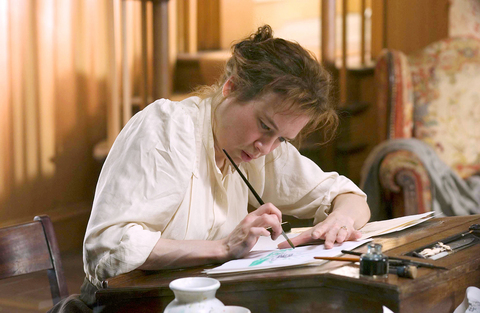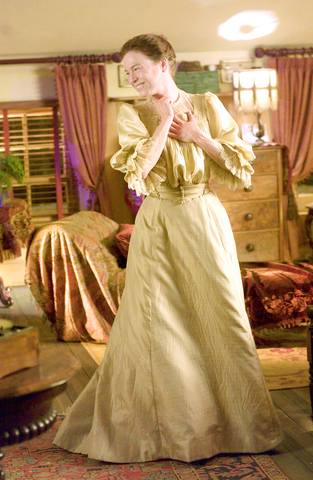In Miss Potter, Renee Zellweger, her face pickled in cheeriness, is Beatrix Potter, the creator of Peter Rabbit, Squirrel Nutkin and Mrs. Tittlemouse, among other beloved characters in children's literature.
This British author and illustrator, as portrayed by Zellweger, is almost as chipper as Julie Andrews's Mary Poppins, but twice as affected and not half as English-sounding. If Zellweger's shaky English accent carried her through two Bridget Jones movies, portraying an upper-middle-class Victorian woman presents a steeper elocutionary challenge. Her enunciation in Miss Potter lacks the starchy refinement demanded by the role. As she scrunches her face into polite grimaces and trills her phrases, you have the sense of an actor straining not to exhaust a limited repertory of genteel English mannerisms.
In Richard Maltby Jr.'s worshipful screenplay, Potter emerges as a plucky heroine for all seasons: a proto-feminist, a proto-environmentalist and a perfect lady. And from the beginning, this innocuous, fiercely Anglophilic trifle of a movie is too nice for its own good. There was plenty of drama in Potter's life, but the film turns major conflicts and losses into minor setbacks in a charmed, entirely virtuous existence. Even a sudden personal tragedy doesn't devastate this indefatigable font of resilience.

PHOTOS COURTEY OF CMC
Miss Potter is easy on the eyes. The first movie directed by the Australian filmmaker Chris Noonan since his sleeper hit, Babe, 11 years ago, it has the same pastel storybook palette and the same overriding mood of gentleness. Scenes filmed in the English Lake District, where Potter vacationed with her family and studied the local fauna, unfold like heavily captioned pages in a travel brochure.
Any hint of whimsy is welcome. And in the picture's most endearing moments, the author's characters stir to animated life on the page as she communes with them. These touches, of which there are too few, suggest a woman who is much more complicated (and eccentric) than Miss Potter lets on. They also evoke the intensity of the creative process through which Potter invented her classic characters out of childhood pets and closely observed wildlife.
The movie concentrates on only a few years in the life of Potter, who was born in 1866 and privately published her first book, The Tale of Peter Rabbit, in 1901. It proved so popular that she took it back to a publisher who had originally rejected it; he reconsidered once she agreed to reillustrate it in color. Published in 1902, it was an enormous hit, and the money she earned from it and its successors brought her independence from her strait-laced, nouveau-riche Victorian family.

The closest thing to a villain in the movie is Potter's snobbish, social-climbing mother, Helen (Barbara Flynn), a stout, severe matriarch who refuses to recognize her daughter's accomplishments even after she earns fame and fortune for her work. Determined that Beatrix marry wealth, she pressures her to choose a husband from a series of suitors, each more grotesque than the one before. Beatrix will have none of it. Her father, Rupert (Bill Paterson), though more sympathetic, kowtows to the will of the fearsome Helen.
Because her publishers, the brothers Harold and Fruing Warne, have low expectations for The Tale of Peter Rabbit — they dismissively refer to it as her "bunny book" — they hand the project to their younger sibling, Norman (Ewan McGregor). The role of a buttoned-up Victorian editor is a complete turnabout from McGregor's usual rakes, but he inhabits it comfortably. Even after Beatrix and Norman become engaged (over her parents' objections), they continue to address each other as Miss Potter and Mr. Warne.
Potter forms a tight friendship with Warne's unmarried sister, Millie (Emily Watson, emitting mischievous sparks), and their sisterhood — they agree that there's more to a woman's life than marriage and children — gives the story its feminist credentials.
Once Potter achieves financial independence, the movie dawdles on pleasantly as she buys Hill Top, a farm in the Lake District, in 1905, and goes on to become a major landowner in the region in a campaign to preserve the area from developers; again, conflicts are minimized.
She later finds romance with a lawyer, William Heelis (Lloyd Owen), whom she would marry in 1913. Potter, who died in 1943, lived way beyond the time frame of the movie. At her death, she left 14 farms and 1,600 hectares of land to the National Trust, along with her flocks of Herdwick sheep.
This much sweetness and light in a movie is all very well. But there's a reason that recipes for cake and cookies call for a pinch of salt. In Miss Potter, there is only a grain or two — not enough to dilute the sugary overload. The film is the cinematic equivalent of a delicate English tea cake whose substance is buried under too many layers of icing.

June 23 to June 29 After capturing the walled city of Hsinchu on June 22, 1895, the Japanese hoped to quickly push south and seize control of Taiwan’s entire west coast — but their advance was stalled for more than a month. Not only did local Hakka fighters continue to cause them headaches, resistance forces even attempted to retake the city three times. “We had planned to occupy Anping (Tainan) and Takao (Kaohsiung) as soon as possible, but ever since we took Hsinchu, nearby bandits proclaiming to be ‘righteous people’ (義民) have been destroying train tracks and electrical cables, and gathering in villages

Dr. Y. Tony Yang, Associate Dean of Health Policy and Population Science at George Washington University, argued last week in a piece for the Taipei Times about former president Ma Ying-jeou (馬英九) leading a student delegation to the People’s Republic of China (PRC) that, “The real question is not whether Ma’s visit helps or hurts Taiwan — it is why Taiwan lacks a sophisticated, multi-track approach to one of the most complex geopolitical relationships in the world” (“Ma’s Visit, DPP’s Blind Spot,” June 18, page 8). Yang contends that the Democratic Progressive Party (DPP) has a blind spot: “By treating any

Swooping low over the banks of a Nile River tributary, an aid flight run by retired American military officers released a stream of food-stuffed sacks over a town emptied by fighting in South Sudan, a country wracked by conflict. Last week’s air drop was the latest in a controversial development — private contracting firms led by former US intelligence officers and military veterans delivering aid to some of the world’s deadliest conflict zones, in operations organized with governments that are combatants in the conflicts. The moves are roiling the global aid community, which warns of a more militarized, politicized and profit-seeking trend

This year will go down in the history books. Taiwan faces enormous turmoil and uncertainty in the coming months. Which political parties are in a good position to handle big changes? All of the main parties are beset with challenges. Taking stock, this column examined the Taiwan People’s Party (TPP) (“Huang Kuo-chang’s choking the life out of the TPP,” May 28, page 12), the Democratic Progressive Party (DPP) (“Challenges amid choppy waters for the DPP,” June 14, page 12) and the Chinese Nationalist Party (KMT) (“KMT struggles to seize opportunities as ‘interesting times’ loom,” June 20, page 11). Times like these can